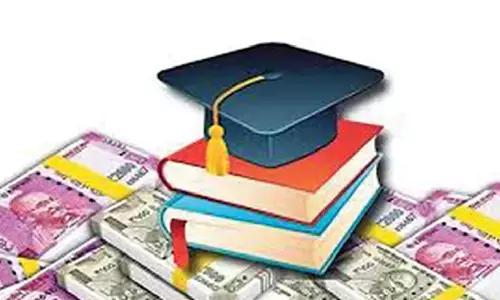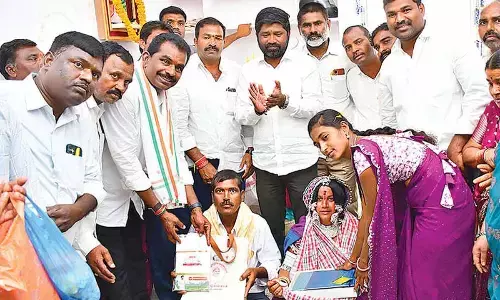Innovation needs bigger encouragement

Innovation needs bigger encouragement
Even in ancient times, when research into disciplines such as mathematics, physics, chemistry, astronomy, and ship building, to mention just a few, flourished, the rulers of the day extended generous support
Even in ancient times, when research into disciplines such as mathematics, physics, chemistry, astronomy, and ship building, to mention just a few, flourished, the rulers of the day extended generous support. In more modern times, while research continues to be supported by governments, the corporate sector has also had its role to play. For instance, when Alexander Graham Bell needed money to develop his "harmonic telegraph", he got much of it from the wealthy father of one of his students, 16-year-old Mabel Hubbard.
Throughout the ages, science has moved forward with boosts from many well-heeled patrons, from monarchs to millionaires. Galileo's heretical revelation, that the Earth revolved around the sun, would have been unlikely if not for his education at the University of Pisa, which was founded by Pope Clement VI, which remembered even today as a devoted patron of the arts and learning.
Why, the internet itself, without which there would be no Google, was developed with funds from the Department of Defense's DARPA (Defense Advanced Research Projects Agency), and the National Science Foundation (NSF), and was based on research conducted at the Massachusetts Institute of Technology (MIT), the University of California, Los Angles (UCLA), and other academic laboratories.
R&D can broadly be categorised into three areas, basic research, applied research and development research. Basic research primarily aims at acquisition of new knowledge, and does not concern itself with its applications or uses. Applied research, on the other hand, generally has an aim objective in mind, and has applications in many fields including education, medicine and business. Development research is concerned with harnessing the knowledge acquired by the other two fields, and employing it to develop new processes and products. Thus, R&D constitutes the first stage in the development of a potentially new service or product.
Flexible R&D dispensations are desirable as they are responsive to signals emerging from the ever changing imperatives of economic development. Countries such as India also need to transform from consumer to producers of technology, so that they can become self – reliant in the technology space, a critical requirement for a sound economic and statistical perspective. This is the surest way towards the destination of Aatma Nirbhar Bharat as declared by Prime Minister Modi. While overall R&D support is essential, focus on research, innovation, standardization, product development, testing and certification, which are integral parts of the total ecosystem, is critical.
A quick look at the manner in which government support to R&D is dispersed, over the different areas, shows that nearly 60 per cent of it goes to agencies working in the areas of Atomic Energy, Space, Earth Sciences, S&T and Bio Technology (BT). In the corporate sector, however, areas that receive the greatest support are healthcare, automotives, software and semiconductors. Clearly, priorities are a function of the perception of profitability investment.
The central government has, it must be said to its credit, taken several policy initiatives to encourage innovation, an aspect that is at the heart of R&D. For instance, it introduced a Patent Box in 2016 similar to that of Brazil, Turkey and Singapore, among others. Incomes from patents are also taxed at a concessional rate.
The priority R&D needs to be accorded is an integral part of the overall narrative concerning options and priorities, which has been discussed in earlier pieces in this column. In the ultimate analysis, it all boils down to the priorities the government of the day identifies in matters of public spend, and the order in which it desires to address them.
At the risk of being repetitive, I would like to ask whether addressing challenges such as the distressing practice of sale of children, the need to protect the honour of women, intensifying the war against scourges just such as poverty, deprivation, iniquity and combatting effectively emerging threats such as climate change, terrorism or, for that matter, the ongoing Covid-19 epidemic, should not receive preferential treatment over issues such as sports, culture or exploration of space or the Arctic continent.
If the answer is yes, which it ought to be, then, surely, increased spend on R&D should also occupy some of the space hitherto crowded out by somewhat less important sectors of the economy. The need of the hour is a paradigm shift towards the development of the infrastructure needed to enable R&D to flourish, and to incentivise the effort, with a proper perspective informed by the market focus. For India to become the world leader in R&D it needs to learn to be an igniter first.
While it is all very well to emphasise on the need for support to R&D, it should not be forgotten that the issue of end-use monitoring also needs close attention. Performance audit, to ensure that the intended results have been achieved, is essential.
Having said all this, we need to remember that our ancestors have bequeathed us with a rich legacy, of ancient, and valuable, Indigenous Technical Knowledge (ITK). The indubitable value of modern science and scientific methods notwithstanding, and while recognizing the pressing need to promote individuals and organisations conducting research in accordance with those methods, this heritage also needs to be preserved, protected and promoted.
While a number of initiatives are already underway, in both the public and private sectors, the central government needs to take the initiative to organise an inventory of all forms and types of ITK, inventorise them, have them validated through appropriate fora in the scientific and technical institutions, and disseminate them to the appropriate destinations, so that they can be put to the best possible use.
Holistic and comprehensive approaches such as, for instance, the one which I knew Dr. C.K. Nayudamma (who, when I first knew him, occupied the position of a Distinguished Scientist - which was accorded by the central government to people of his eminence and experience), recommended, namely, the 'leaf to route' approach.
It must be remembered that, in the ultimate analysis, it is not so much the institutions, but the individuals, that have always contributed to the progress of S&T. To quote Dr. Nayudamma once again, "the greatest resource of the country is the resourcefulness of the individual".
(The writer is former Chief Secretary, Government of Andhra Pradesh)










